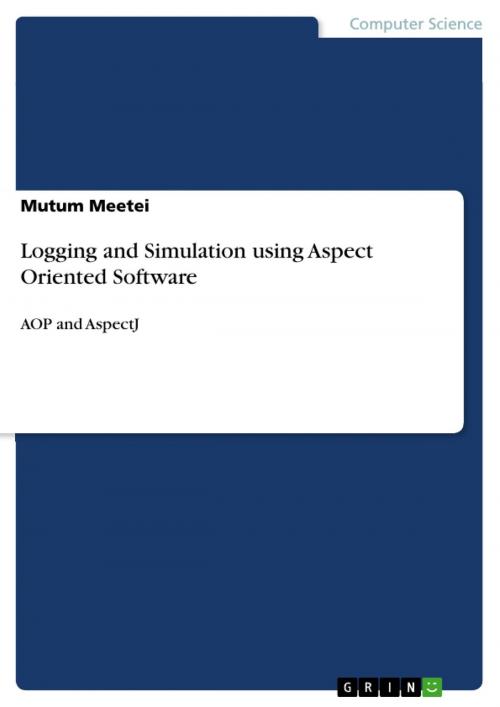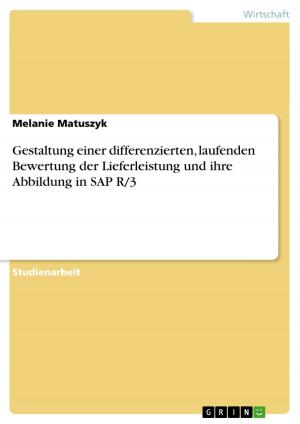Logging and Simulation using Aspect Oriented Software
AOP and AspectJ
Nonfiction, Computers, Programming| Author: | Mutum Meetei | ISBN: | 9783656862123 |
| Publisher: | GRIN Verlag | Publication: | December 17, 2014 |
| Imprint: | GRIN Verlag | Language: | English |
| Author: | Mutum Meetei |
| ISBN: | 9783656862123 |
| Publisher: | GRIN Verlag |
| Publication: | December 17, 2014 |
| Imprint: | GRIN Verlag |
| Language: | English |
Document from the year 2014 in the subject Computer Science - Applied, , course: Applied Mathematics, language: English, abstract: Software testing is a process designed to make sure computer code does what it is designed to do and that it doesn't do anything unintended. It is used to achieve quality assurance, verification, validation and reliability estimation. It is a major quality control measure used during the software development. Testing is the process of operating a system or component under specified conditions, observing or recording the results, and making an evaluation of some aspect of system or a component.Testing of software is done at different levels of abstraction - unit, integration and system levels. During testing of software, there is a need to observe the internal and external execution details of the software. The internal execution details are required for the diagnosis of incorrect output during testing, and to ensure correctness of processing in case of a correct output. Without observing the internal execution details, the incorrect results may appear to be correct. Logging is a systematic method of recording the internal information of software. It is one of the typical examples of crosscutting concern (concerns that are common to many of the core modules that span multiple modules). By examining the log, an unexpected system behavior can be identified and corrected. It acts as a diagnostic assistant to reveal the inner working of a system. Logging is also used for different purposes like debugging, testing, auditing, performance monitoring, code profiling, etc. Besides logging, the theory of random phenomena has always had widespread appeal not least because of its application to games of chance and speculation. The fundamental notion is that of the expected value of a bet. The Monte Carlo method computes this expected value by simulating a large number of scenarios and averaging the observed payoff of the bet over all scenarios. The simulation of the scenarios is best performed by a computer program. Computational power is becoming cheap and programming languages more powerful and more elegant. Object orientation in particular represents a significant advance over procedural programming. Aspect-oriented programming (AOP) is a new programming paradigm [?35]. It is popular for the use of modularizing concerns that that cross-cut the basic functionality of a program like logging. AOP has provided a new mechanism for encapsulating crosscutting concern in a module unit call aspect. The advantages of simulation techniques using AOP is discussed.
Name: Dr. Mutum Zico Meetei Employed at: Department of Mathematics, Faculty of Science, Jazan University, Saudi Arabia Profession: Assistant Professor Highest Degree: Ph.D Interest: Mathematical Modeling, Software Testing, Cloud Computing, Simulations
Document from the year 2014 in the subject Computer Science - Applied, , course: Applied Mathematics, language: English, abstract: Software testing is a process designed to make sure computer code does what it is designed to do and that it doesn't do anything unintended. It is used to achieve quality assurance, verification, validation and reliability estimation. It is a major quality control measure used during the software development. Testing is the process of operating a system or component under specified conditions, observing or recording the results, and making an evaluation of some aspect of system or a component.Testing of software is done at different levels of abstraction - unit, integration and system levels. During testing of software, there is a need to observe the internal and external execution details of the software. The internal execution details are required for the diagnosis of incorrect output during testing, and to ensure correctness of processing in case of a correct output. Without observing the internal execution details, the incorrect results may appear to be correct. Logging is a systematic method of recording the internal information of software. It is one of the typical examples of crosscutting concern (concerns that are common to many of the core modules that span multiple modules). By examining the log, an unexpected system behavior can be identified and corrected. It acts as a diagnostic assistant to reveal the inner working of a system. Logging is also used for different purposes like debugging, testing, auditing, performance monitoring, code profiling, etc. Besides logging, the theory of random phenomena has always had widespread appeal not least because of its application to games of chance and speculation. The fundamental notion is that of the expected value of a bet. The Monte Carlo method computes this expected value by simulating a large number of scenarios and averaging the observed payoff of the bet over all scenarios. The simulation of the scenarios is best performed by a computer program. Computational power is becoming cheap and programming languages more powerful and more elegant. Object orientation in particular represents a significant advance over procedural programming. Aspect-oriented programming (AOP) is a new programming paradigm [?35]. It is popular for the use of modularizing concerns that that cross-cut the basic functionality of a program like logging. AOP has provided a new mechanism for encapsulating crosscutting concern in a module unit call aspect. The advantages of simulation techniques using AOP is discussed.
Name: Dr. Mutum Zico Meetei Employed at: Department of Mathematics, Faculty of Science, Jazan University, Saudi Arabia Profession: Assistant Professor Highest Degree: Ph.D Interest: Mathematical Modeling, Software Testing, Cloud Computing, Simulations















